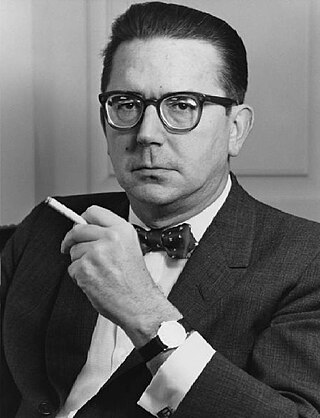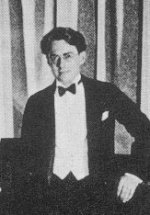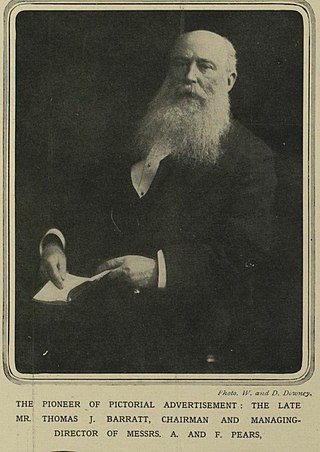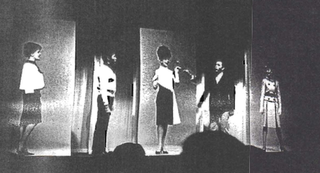Related Research Articles

Advertising is the practice and techniques employed to bring attention to a product or service. Advertising aims to put a product or service in the spotlight in hopes of drawing it attention from consumers. It is typically used to promote a specific good or service, but there are wide range of uses, the most common being the commercial advertisement.

A slogan is a memorable motto or phrase used in a clan, political, commercial, religious, or other context as a repetitive expression of an idea or purpose, with the goal of persuading members of the public or a more defined target group. The Oxford Dictionary of English defines a slogan as "a short and striking or memorable phrase used in advertising". A slogan usually has the attributes of being memorable, very concise and appealing to the audience.

A television advertisement is a span of television programming produced and paid for by an organization. It conveys a message promoting, and aiming to market, a product, service or idea. Advertisers and marketers may refer to television commercials as TVCs.
Advertising slogans are short phrases used in advertising campaigns to generate publicity and unify a company's marketing strategy. The phrases may be used to attract attention to a distinctive product feature or reinforce a company's brand.

Neoprene is a family of synthetic rubbers that are produced by polymerization of chloroprene. Neoprene exhibits good chemical stability and maintains flexibility over a wide temperature range. Neoprene is sold either as solid rubber or in latex form and is used in a wide variety of commercial applications, such as laptop sleeves, orthopaedic braces, electrical insulation, medical gloves, liquid and sheet-applied elastomeric membranes or flashings, and automotive fan belts.

A billboard is a large outdoor advertising structure, typically found in high-traffic areas such as alongside busy roads. Billboards present large advertisements to passing pedestrians and drivers. Typically brands use billboards to build their brands or to push for their new products.
Synthetic fibers or synthetic fibres are fibers made by humans through chemical synthesis, as opposed to natural fibers that are directly derived from living organisms, such as plants or fur from animals. They are the result of extensive research by scientists to replicate naturally occurring animal and plant fibers. In general, synthetic fibers are created by extruding fiber-forming materials through spinnerets, forming a fiber. These are called synthetic or artificial fibers. The word polymer comes from a Greek prefix "poly" which means "many" and suffix "mer" which means "single units"..

In promotion and advertising, a testimonial or show consists of a person's written or spoken statement extolling the virtue of a product. The term "testimonial" most commonly applies to the sales-pitches attributed to ordinary citizens, whereas the word "endorsement" usually applies to pitches by celebrities. Testimonials can be part of communal marketing.

Better Living Through Chemistry is the debut studio album by English electronic music producer Fatboy Slim. It was released on 23 September 1996 in the United Kingdom by Skint Records and in the United States by Astralwerks. It was Fatboy Slim's first work to chart outside of the UK, with the single "Going Out of My Head" notably charting in the US, and was certified gold by the BPI.

Rosser Reeves was an American advertising executive and pioneer of television advertising; Reeves generated millions for his clients. The Ted Bates agency, where he rose to chairman, exists today as Bates CHI & Partners.

"Think different" is an advertising slogan used from 1997 to 2002 by Apple Computer, Inc., now named Apple Inc. The campaign was created by the Los Angeles office of advertising agency TBWA\Chiat\Day. The slogan has been widely taken as a response to the IBM slogan "Think". It was used in a television advertisement, several print advertisements, and several TV promos for Apple products.
Happy Bunny is a character in a series of stickers, buttons, greeting cards, posters, and other merchandise sold at novelty shops across North America. Designed by artist and writer Jim Benton in the 1990s, whom People Magazine called "the most visible cartoonist in America," Happy Bunny is a small, smiling bunny, often varying in color, with an insulting slogan printed at its feet. Happy Bunny gained popularity in 2001 after stores like Hot Topic and Spencers began selling its merchandise.
BBDO is a worldwide advertising agency network, with its headquarters in New York City. The agency originated in 1891 with the George Batten Company, and in 1928, through a merger with Barton, Durstine & Osborn (BDO), the agency became Batten, Barton, Durstine & Osborn. With more than 15,000 employees at 289 offices in 81 countries, it is the largest of three global networks of agencies in the portfolio of Omnicom Group.

Cavalcade of America is an anthology drama series that was sponsored by the DuPont Company, although it occasionally presented musicals, such as an adaptation of Show Boat, and condensed biographies of popular composers. It was initially broadcast on radio from 1935 to 1953, and on television from 1952 to 1957. Originally on CBS, the series pioneered the use of anthology drama for company audio advertising.

A poster is a large sheet that is placed either on a public space to promote something or on a wall as decoration. Typically, posters include both textual and graphic elements, although a poster may be either wholly graphical or wholly text. Posters are designed to be both eye-catching and informative. Posters may be used for many purposes. They are a frequent tool of advertisers, propagandists, protestors, and other groups trying to communicate a message. Posters are also used for reproductions of artwork, particularly famous works, and are generally low-cost compared to the original artwork. The modern poster, as we know it, however, dates back to the 1840s and 1850s when the printing industry perfected colour lithography and made mass production possible.

Thomas James Barratt (1841–1914) was an English businessman who was the chairman of the soap manufacturer A. & F. Pears. A pioneer of brand marketing, he has been called "the father of modern advertising".
"We Bring Good Things to Life" was an advertising slogan used by General Electric between 1979 and 2003. It was designed by the advertising firm BBDO led by project manager Richard Costello, who would later go on to become head of advertising at General Electric. The slogan was designed to highlight the diversity of the products and services the company offered. The slogan, after its many appearances in GE advertising, was responsible for increased popularity and a new image for the company. General Electrics pushed out this marketing campaign spending a billion dollars in adverting. The "We Bring Good Things to Life" focused mainly on General Electric's appliances and lighting fixtures.
"Better Living Through Chemistry" is a variant of a 1935 DuPont advertising slogan.
DuPont de Nemours, Inc., commonly shortened to DuPont, is an American multinational chemical company first formed in 1802 by French-American chemist and industrialist Éleuthère Irénée du Pont de Nemours. The company played a major role in the development of the U.S. state of Delaware and first arose as a major supplier of gunpowder. DuPont developed many polymers such as Vespel, neoprene, nylon, Corian, Teflon, Mylar, Kapton, Kevlar, Zemdrain, M5 fiber, Nomex, Tyvek, Sorona, Corfam and Lycra in the 20th century, and its scientists developed many chemicals, most notably Freon (chlorofluorocarbons), for the refrigerant industry. It also developed synthetic pigments and paints including ChromaFlair.

The Wonderful World of Chemistry is a 1964 industrial musical revue by Michael Brown. Regular performances were a feature of the DuPont Pavilion at the 1964 New York World's Fair.
References
- ↑ Trif Alatzas (April 29, 1999). "DuPont touts 'miracles'". The News Journal (Wilmington, DE).
We need to get away from the word 'things,' " [DuPont Chairman and Chief Executive Charles O.] Holliday said. "Because we're also about providing knowledge.
- ↑ "Better Living Through Chemistry - Lead Pipe Posters - Vintage Rock Art Posters, Psychedelic Art Posters and More". Archived from the original on June 1, 2015. Retrieved April 26, 2012.
- ↑ Anna McCarthy, The Citizen Machine: Governing by Television in 1950s America, New York: The New Press, 2010, p. 50. ISBN 978-1-59558-498-4.
- ↑ Coy, Peter (August 28, 2019). "Why the Periodic Table of Elements Is More". Bloomberg Businessweek. Archived from the original on August 28, 2019. Retrieved February 4, 2021.